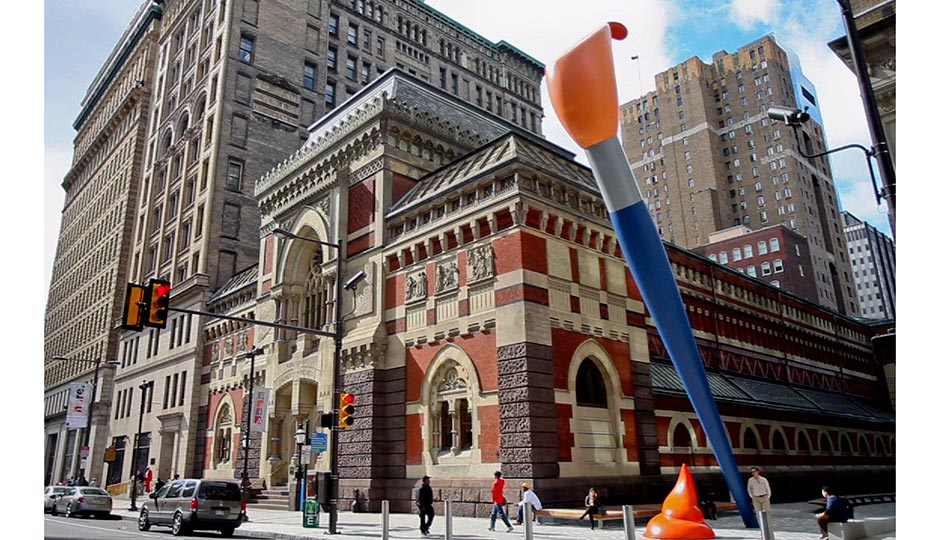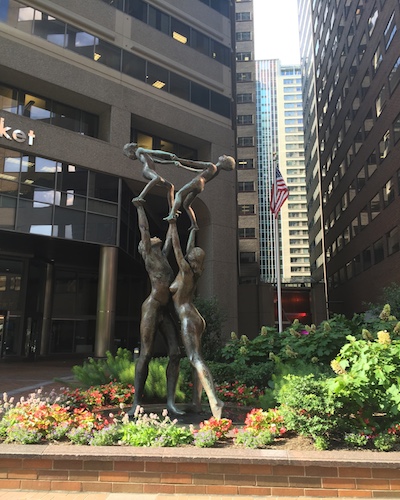The 12 Worst Pieces of Public Art in Philly
Philadelphia is a city awash in public artworks. Some of them are magnificent. Some of them are dreadful. The thing about public art that’s dreadful is that you can’t just go at it with a sledgehammer, even if you have to walk past the dad-blasted thing twice a day every day. All you can do with bad public art is shine a bright light on it, wonder what the hell the powers-that-be were thinking, marvel at the artistic conventions of earlier eras, and hold it up to shame and ridicule, which is what we’re doing here. Forthwith, in ascending order of awfulness, we present the 12 worst pieces of public art in Philadelphia.
The Wrestlers, artist unknown (1885)
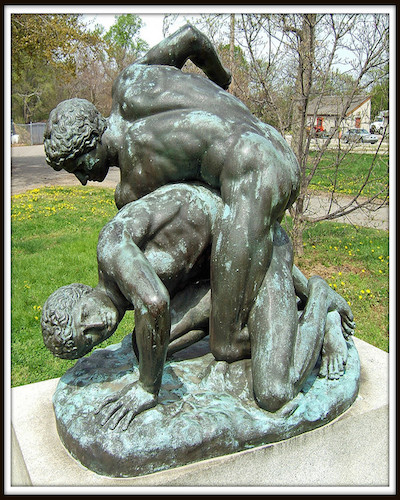
The Wrestlers. Tony Fischer under Creative Commons 2.0 license, resized.
The Horticultural Center, Fairmount Park
This Victorian-era copy of a Roman copy of a long-lost Greek original sculpture, variously attributed to various “artists,” features two buck-nakey dudes grappling away in a sweaty frenzy that makes MMA look lame. (It’s Dan McQuade’s favorite public art.) What propels it onto this list is that neither of the heads is original to the Roman copy, which was dug up in a vineyard in the 1500s and caused a Renaissance sensation. The bottom head comes from a different statue altogether, and the top head was modeled after it. So, Frankenstein.
John B. Kelly (The Rower), John Rosin (1946)
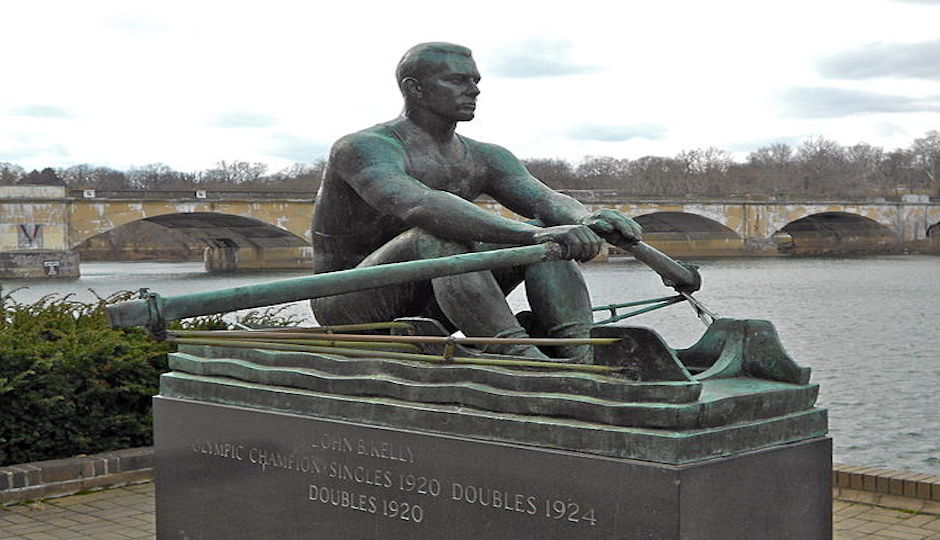
John B. Kelly (The Rower).
Smallbones via Wikimedia Commons under Creative Commons CC0 1.0 license, resized.
Near the rowing grandstands on Kelly Drive
This, of course, is Princess Grace’s daddy, who won three gold medals rowing in the Olympics in the 1920s, thereby sticking it to England’s Henley Royal Regatta, which had refused to let him participate because he’d manually labored as a bricklayer. (Seriously.) We have no problem with honoring Kelly, the prototype for so many later Philly underdog heroes (Rocky, Rendell, Sam Hinkie). Our quibbles are aesthetic. Rowing is about expansiveness, about freedom and wings on the water—but poor Jack looks so cramped and constricted. Who chopped off his scull and oars?
The Preacher, Waldemar Raemisch (1952)

The Preacher. Smallbones via Wikimedia Commons under Creative Commons CC0 1.0 license, resized.
The Ellen Phillips Samuel Memorial on Kelly Drive
What is this man doing with his hands? Oh, wait — if he didn’t hold them up like that, his knuckles would drag on the ground, right? Very subtle jab at religion, Waldemar — or a crappy-ass sense of proportion.
Paint Torch, Claes Oldenburg (2010)
Outside the Pennsylvania Academy of the Fine Arts
Have you ever thought about how many Oldenburgs there are in Philly? We have the clothespin thing, the button thing, the electric-plug thing, and this thing, with its poop pile of orange at the base. Does any other city get suckered in by so much of Oldenburg’s shit? Right now, he’s likely over in Stockholm rubbing his palms together and wondering what new eyesore he can pawn off on our oh-so-gullible citizenry. We really have got to learn to say no to giant household items.
Benjamin Franklin, Craftsman, Joseph Brown (1981)
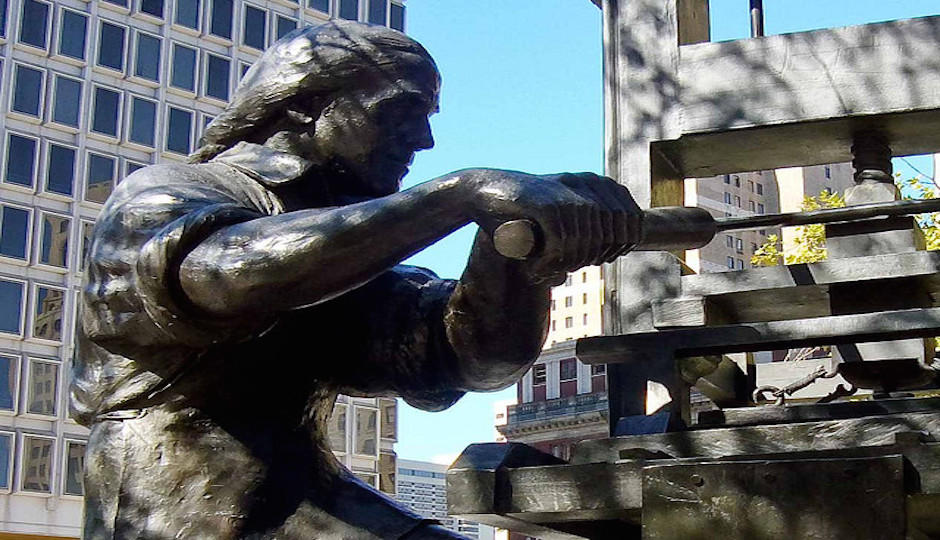
Ben Franklin, Craftsman. Paul Joseph under Creative Commons 2.0 License, resized.
Outside the Masonic Temple at Broad and JFK Boulevard
Rumor has it that Joseph Brown was going blind by the time the Freemasons commissioned him to create this gigundo statue of Ben Franklin, and we believe it. There’s something so aggressively off about the proportions of the Princeton prof’s rendering of our fave founding father that every time we see it, we cringe. The city is dotted with Brown’s statues of people who appear to be of normal proportions, so who knows? Either he had it in for Ben or he had to squint.
Kangaroos by Harold Kimmelman (1970)
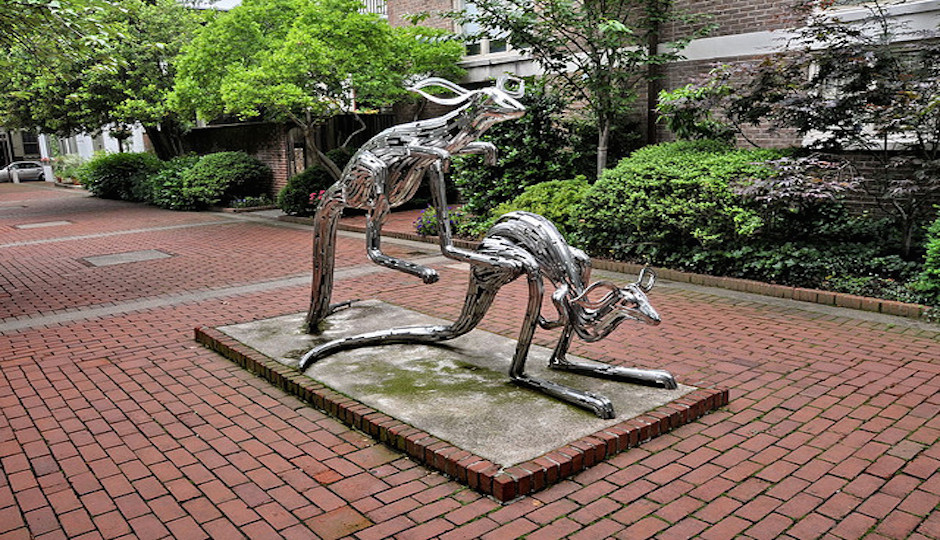
Kangaroos. FaceMePls under Creative Commons 2.0 license, resized.
Lawrence Court (between 4th and 5th and Spruce and Pine)
Why? Why kangaroos? Why kangaroos here? Why kangaroos that appear to be humping one another? Kimmelman, a native Philadelphian, has crap scattered all over the city. This is just our least favorite of a mediocre lot.
The Great Mother and The Great Doctor, Waldemar Raemisch (1955)
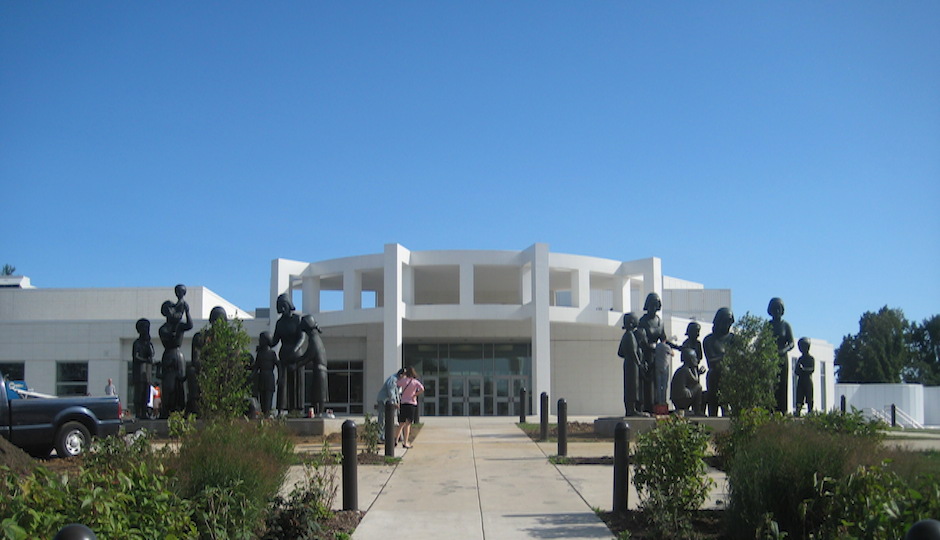
The Great Mother and The Great Doctor. Photo via Philadelphia Dept. of Arts, Culture and Creative Economy, image altered.
4021 Parkside Avenue, Fairmount Park
These twin horrors used to stand outside the Youth Study Center on the Parkway, where they no doubt scared straight generations of teens. They’re continuing that yeoman work in their new home outside the Philadelphia High School of the Future in West Philly. How creepy are those blank-eyed little kids? This is like a paean to pedophilia.
Government of the People, Jacques Lipchitz (1976)
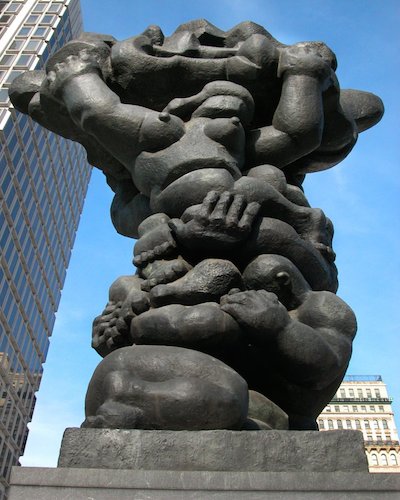
Government of the People. K. Ciappa for Visit Philadelphia, resized.
Municipal Services Building Plaza, Broad and JFK Boulevard
Want proof of how screwed-up the city’s celebration of the 1976 Bicentennial was? Look no further than this bronze monstrosity commissioned for the occasion. Arts patron and mayor Frank Rizzo did his damnedest to thwart the installation of what he said looked like “a plasterer had dumped a load of plaster,” but the Fairmount Park Art Association persevered even after Lipchitz died with the piece uncompleted. Damn, we were that close.
Social Consciousness, Sir Philip Epstein (1954)
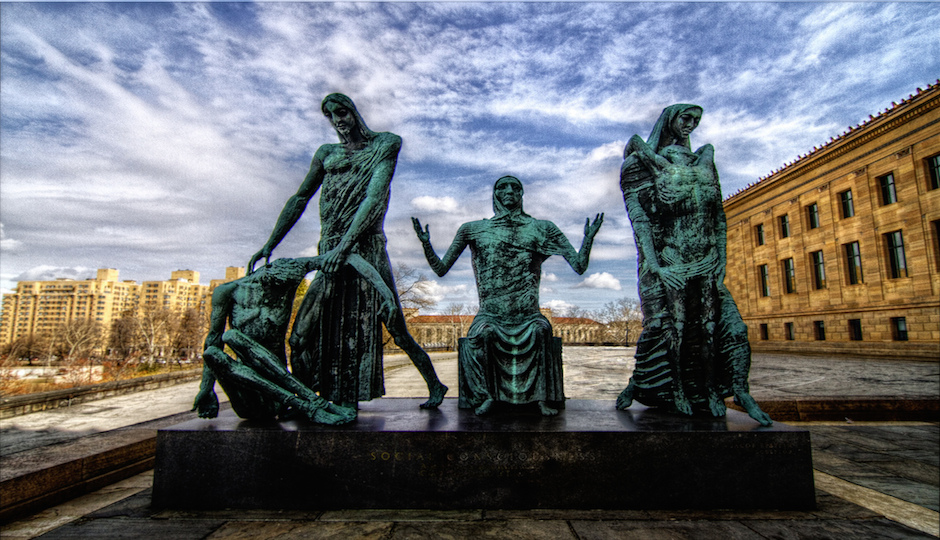
Social Consciousness. KellarW under Creative Commons 2.0 license, resized.
West entrance to the Art Museum
Let’s not even discuss the irony of a knight lecturing us about social consciousness. This heartwarming faux-primitive tableau of misery and despair clearly served as the inspiration for The Walking Dead.
Frank L. Rizzo Monument, Zenos Frudakis (1998)
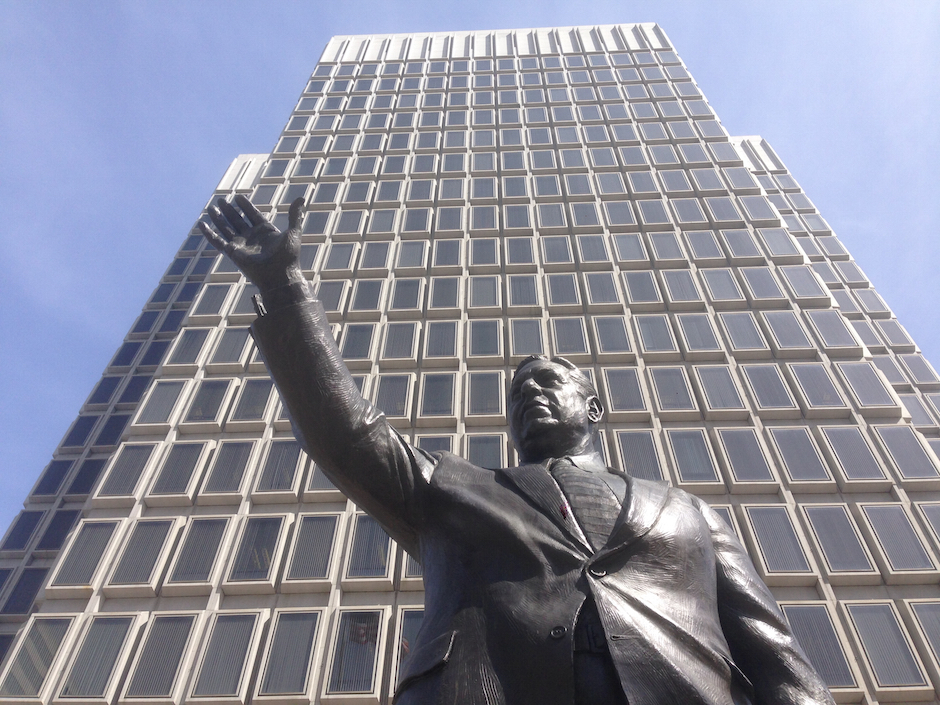
The Department of Revenue’s home , the Municipal Services Building. Photo by Paulina Issac.
Municipal Service Building Plaza, Broad and JFK Boulevard
Taxi!
The Stroll, William King (1995)
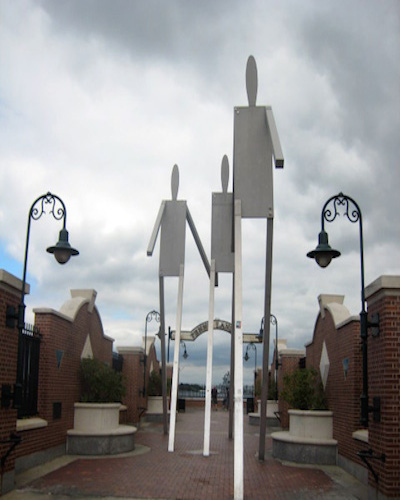
The Stroll. Lulu Hoeller under Creative Commons 2.0 license, image altered.
South Street between Front and Columbus
All we ever think about when we see this is the video for Money for Nothing by Dire Straits.
Family, Timothy Duffield (1981)
Market Street between 18th and 19th
This statue of a big, aggressively unattractive, assertively naked, egregiously thin mom, dad and kids is like a monument to anorexia. Sunoco paid Duffield $200,000 for it; when the company’s execs sold the building in 2011, they tried to unload it on another buyer, but there weren’t any takers, so they left it where it was. Now that’s bad art.
